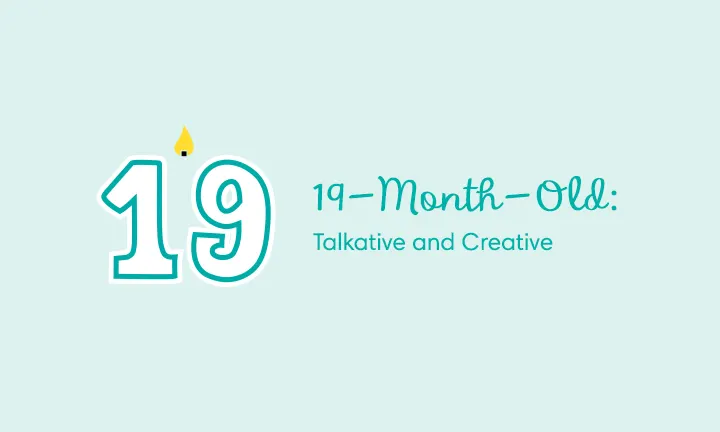19-month-old Milestones: Talkative and Creative
As your 19-month-old continues to grow, she may have a lot to say. You may be delighted with her ever-expanding vocabulary - some of those cute made-up words will melt your heart. Soon these words may be replaced with properly pronounced words, making you feel proud of your child.
In this month, continue to nurture your little one’s creativity by involving in dancing, singing, and playing with her. It’s almost hard to keep up with your child's speedy growth. Keep reading to know what's in store this month for you and your toddler.
19 Months Baby Development Milestones
As you may have noticed, your toddler might reach certain 19-month baby milestones a little earlier or later than other children of a similar age. Each toddler is unique and learns and grows at her own pace.
For this reason, these are just some examples of what your little one may get up to at around 19 months:
May say several words:
Your toddler may be able to say many simple words, such as those for her favourite toys, people, and parts of the body. Keep in mind that boys typically take longer to master language skills compared to girls. In the beginning, you might be the only one who understands your toddler’s made-up words, but with your patient correct pronunciation in response, she’ll soon learn to say these words correctly.
Expands her vocabulary:
Over time, your toddler may understand and use an increasing number of words. Help build her vocabulary by repeating words and verbalising her activities, as well as by having conversations together. So, for example, if your toddler motions for you to come play with her, you can say “You’d like me to come play with you? Show me what you’re doing!”
May use one hand more than the other:
Around this time your toddler may show a preference for using her right hand over her left, or vice versa. But this doesn’t mean that she is definitely going to be right-handed or left-handed. The development of a dominant hand usually happens over the course of several years. Your child may even be ambidextrous, able to use both hands equally well.
Support for 19-Month-Old Baby Development
Here’s how you can support your 19-month-old’s development at home:
If you speak a foreign language, use it:
If your family is bilingual, use both languages with your toddler. You'll help forge a connection to these cultures as well as foster her language skills. And don’t worry if your child mixes both languages, as it’s completely expected. Eventually she’ll know how to separate them.
Encourage creativity:
Around this time, your toddler may find an interest in scribbling—whether it’s on paper or maybe even on other things! Encourage her creativity by providing her with markers, crayons, or coloured pencils and lots of paper to fill up with artwork. It may be a good idea to keep the art supplies tucked away when not in use to prevent her from drawing on the walls and other places.
Make bath time fun:
Give your toddler some objects to play with in the tub, such as squeeze toys, floating animals and boats, and plastic cups she can use to fill with water and splash around. Just remember never to leave your toddler unattended during a bath.
Dance and sing with your little one:
Take every opportunity to combine music and movement. For example, make up a little song when you’re dressing her, or play some music for an impromptu dance party. These moments can help you bond with your little one as well as boost her development.
Limit screen time:
Your toddler may want to watch TV or play a video game especially after seeing an older peer or sibling do so, but it’s important to limit your toddler’s screen time, as too much passive viewing at this age can delay cognitive development. Instead, encourage unplugged, active play as much as possible.
Read and reread:
Does your 19-month-old have a favourite book she wants to hear again and again? This is her busy brain at work, so go ahead and keep reading what she wants. Ask her some questions about the story as you go along, such as "Do you know what the bear will do next?" Feel free to add gestures and sound effects, too. Before long, she'll be "reading" the words along with you!
19-month-old Baby Milestone: Eating
Don’t be amazed to see your 19-month-old being picky about food. She might refuse to eat certain foods one minute and eat everything the next. She may even reject a food she enjoyed eating just a few days before.
You can offer your toddler three small meals and at least two snacks every day. Don't panic if your little one skips a meal or a snack; it's OK! As long as you provide different nutritious foods for her to choose from, her diet will balance out over the span of a few days. Let your toddler choose what and how much to eat. Inculcate the habit of sitting down and eating, as eating while running around can lead to choking.
Using mealtimes to teach good table manners is a great idea. Let her know that she should eat with her mouth closed and should not speak while chewing and swallowing food.
Watching you and your partner use the cutleries might make her enthusiastic about using them. You can teach her how to use a spoon and fork properly and let her practice daily. It’s alright if she fumbles when using her spoon or fork in the beginning while accidentally flinging food everywhere. Remember, it’s a learning experience for her and as time progresses, she’ll master these skills.
Check for Food Allergies
As your child tries all kinds of new foods, you may be concerned about a food allergy developing, especially if allergies run in your family.
Luckily, food allergies are relatively rare in young children, occurring in less than eight percent of children under three years of age. Still, it’s important to know what signs to look for, just in case. Here are some of the signs of a food allergy:
Skin problems that may include hives, rashes, and swelling
Breathing problems that may include sneezing, wheezing, or tightness in the throat
Stomach symptoms that may include nausea, vomiting, or diarrhoea
Circulation problems that can lead to pale skin, light-headedness, or loss of consciousness.
Foods that may cause allergic reactions include:
Cow’s milk
Eggs
Peanuts and tree nuts
Soy
Wheat
Fish and shellfish.
Sometimes children don't have a true food allergy but instead have a food intolerance or food sensitivity, which is much more common. A number of children have what's called a lactose intolerance, meaning that they have trouble digesting the natural sugars found in dairy products like milk. This can lead to symptoms such as bloating, stomach aches, and loose stools.
Consult your child’s doctor if you suspect your child may have an allergy or an intolerance. The doctor will be able to diagnose a food allergy or intolerance by running some tests. In some cases, you may be referred to an allergist, who may be able to help with a treatment plan.
Sleep Schedule for 19-Month-Old Toddlers
At 19 months old, your toddler needs about 12 to 14 hours of sleep per day, which includes at least one nap, too.
If your toddler is having some sleep problems such as resisting going to bed, waking up during the night, or experiencing nightmares, it’s advised that you review your bedtime routine.
Tips for Better Quality Sleep
Take a look at these ideas to see if any might help your toddler have better quality sleep:
Aim to have your toddler go to bed at the same time every night and wake up at the same time every morning. Stick to a consistent naptime schedule.
Implement a bedtime routine for at least 30 minutes before bedtime. This can include giving your toddler a bath, reading her a book, and singing her a soothing lullaby. Let her pick the book she wants to read or the song she’d like to sing.
Let her have a security object, like a favourite stuffed animal or a blankie, when she goes to bed. This can help with night awakenings, as the object can provide a sense of security and might help her self-soothe and fall back to sleep.
Ensure that your child’s bedroom is quiet and comfortable. Your child may like the door left slightly open to allow some light in or to have a night-light.
When putting your toddler in her crib, make sure she is in a sleepy but awake state, which can help her associate this feeling with going to sleep.
If sleep problems persist, be sure to reach out to your child's doctor for guidance.
Planning Your Toddler’s Activities
Whether its building with toy blocks or throwing a ball, play is crucial for your toddler. It's through play that he learns and develops in so many ways.
Each of his movements, small and large, are steps toward developing better coordination, muscle control, balance, and much more. Encourage your toddler to stay active by being an active participant in his play, such as playing with a ball or playing catch with you.
Experts recommend that toddlers get at least 30 minutes a day of structured physical activity led by you or another adult, such as playing catch, along with at least 60 minutes of unstructured physical activity where your toddler can do as he pleases, such as running around in the backyard. Of course, you’ll want to supervise all of his activities.
This may sound like a lot of activity, but this mix of structured and unstructured play along with rest in between all contributes to your child’s happy and healthy development.
Your Life as a Parent: Take Some Time Off
Raising a 19-month-old can get super hectic and chaotic. Hence, it's also important to take care of yourself to help cope with everything that comes your way.
You need a lot of energy to take care of your toddler, leading you to quickly get tired. Both of you will know when you’re tired. It’s OK to ask your partner, a family member, or a babysitter to take over for an hour or two during these moments. Utilise this time as “me time” and do something just for you. It gives you the chance to refresh your mind and mood.
You could try attending story time with your child at a local library or meeting up with friends and their children at a playground or park, or getting together with parents from your little one’s day care to share stories and tips to avoid feeling isolated.
Another best way to help relieve some stress or anxiety while juggling all of parenting's ups and downs is to create a network of supportive parents. This way, you will have someone to talk to who’s in a similar situation as yours.



